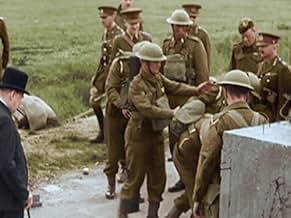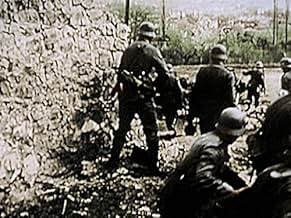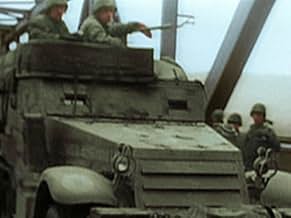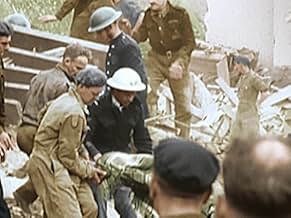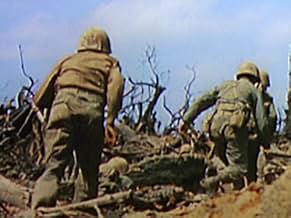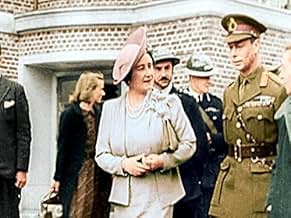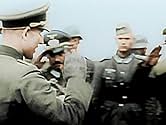Segunda Guerra Mundial em Cores
Título original: World War II in Colour
AVALIAÇÃO DA IMDb
8,7/10
7,8 mil
SUA AVALIAÇÃO
Descubra uma coleção de imagens raras da Segunda Guerra Mundial que foram coloridas digitalmente. Esse novo olhar oferece uma perspectiva diferente sobre a história do conflito.Descubra uma coleção de imagens raras da Segunda Guerra Mundial que foram coloridas digitalmente. Esse novo olhar oferece uma perspectiva diferente sobre a história do conflito.Descubra uma coleção de imagens raras da Segunda Guerra Mundial que foram coloridas digitalmente. Esse novo olhar oferece uma perspectiva diferente sobre a história do conflito.
- Artistas
Explorar episódios
Avaliações em destaque
A cursory review of a series which is quite the opposite; WWII In Color is an awe-inspiring look into the second world war which provides the viewer with a comprehensive understanding of the events of WWII through narration and colorized video. This series ― narrated by Robert Powell ― covers the entirety of WWII from precursory events which would kick-start the war, to Japan's surrender and the beginning of the Cold War. In an already academically intense genre, World War II in HD Color not only meets high expectations, but exceeds them entirely. Easy to pick up, this well-researched series condenses the war into a few episode's worth of educational content. Robert Powell's delivery in narrating vital moments in the war is perfectly done as his talent shows in such a way that the viewer will surely feel the emotion behind each and every catastrophic event. Furthermore, the footage is truly moving accompanied by the expert narration which includes: devastating footage of a holocaust concentration camp, adrenaline-filled battles, convening of world leaders and more, accompanied by geographic animations, the colorized footage is sure to leave an impact. In essence, this 5 star, extremely detailed and historically accurate series will ensure you come away with nothing less than a complete understanding of many events in the Eastern and Western Fronts, the North African Campaign, and the Pacific War via colorized video and emotionally moving narration.
The segment "The Island War" treats the liberation of the Phillipines as an unnecessary and overly costly (and therefore ill-advised) operation. However, that totally fails to recognize that in war, there are both military and political concerns and that grand strategy requires the consideration of both. War is, quite simply, foreign policy pursued by other means. Therefore, foreign policy has to be considered in the strategy of the war.
Because the USA had a commitment to the Phillipine people as a protectorate, it was politically necessary to return as soon as was humanly possible. MacArthur may have left, but Phillipine guerrillas had been fighting and dying against the Japanese with US supplies and coordination from the very beginning. To ignore a chance to liberate the Phillipines would have been no different than leaving Paris in German hands while liberating Holland and Belgium. It was politically imperative! Likewise, the episode maintained that the "Northern arm" of the Japanese pincer had "only pretended to retreat and under cover of darkness had reversed course..." both Japanese and American accounts, much closer to the event when interviews with actual participants were available, indicated that the Northern force actually intended to retreat and only reversed course following critical comments from the high command.
Halsey had every reason to have believed that the Northern force was less a threat than Ozawa's aircraft carrier force which had just been spotted. Every previous naval victory in WWII had come at the hands of the aircraft carriers, NOT the battleships. When confronted by two enemies... one with a knife and the other with a machine gun, only the fool deals with the knife first! There were American POWs held in the Phillipines. Many were saved during this operation. The civilian casualties were indeed great, but that was the choice of the Japanese occupiers and how many would've died, either of brutality or starvation had the islands been bypassed? The further we get from WWII, the less accurate do the "documentaries" become. You can tell a good story with the films, but unless you have spent years studying the contemporary histories, from both sides... false conclusions will run rampant. As the last of the participants pass from this life, there can be no more "factual" accounts. The eyewitnesses are silent now. Don't just watch, READ, READ, READ the books that were published before 1960.
Because the USA had a commitment to the Phillipine people as a protectorate, it was politically necessary to return as soon as was humanly possible. MacArthur may have left, but Phillipine guerrillas had been fighting and dying against the Japanese with US supplies and coordination from the very beginning. To ignore a chance to liberate the Phillipines would have been no different than leaving Paris in German hands while liberating Holland and Belgium. It was politically imperative! Likewise, the episode maintained that the "Northern arm" of the Japanese pincer had "only pretended to retreat and under cover of darkness had reversed course..." both Japanese and American accounts, much closer to the event when interviews with actual participants were available, indicated that the Northern force actually intended to retreat and only reversed course following critical comments from the high command.
Halsey had every reason to have believed that the Northern force was less a threat than Ozawa's aircraft carrier force which had just been spotted. Every previous naval victory in WWII had come at the hands of the aircraft carriers, NOT the battleships. When confronted by two enemies... one with a knife and the other with a machine gun, only the fool deals with the knife first! There were American POWs held in the Phillipines. Many were saved during this operation. The civilian casualties were indeed great, but that was the choice of the Japanese occupiers and how many would've died, either of brutality or starvation had the islands been bypassed? The further we get from WWII, the less accurate do the "documentaries" become. You can tell a good story with the films, but unless you have spent years studying the contemporary histories, from both sides... false conclusions will run rampant. As the last of the participants pass from this life, there can be no more "factual" accounts. The eyewitnesses are silent now. Don't just watch, READ, READ, READ the books that were published before 1960.
The video quality has been brought up to a near 1970's quality and after a while you start taking it for granted.
This is an educational series with narration all the way through, in near chronological order with clear maps showing how the front line of the battles moved around europe, Africa and asia.
There has been unfair reviews saying that the series favours the British efforts of the war and perhaps it does as the series was probably compiled in Britain. You have to remember though that they are only covering the footage that they have from the war and Britain was fighting the war in Europe single handedly for a couple of years, whilst fighting in Africa and Asia. The red army probably played a bigger part towards defeating Germany and to be fair this series does cover this quite well in 2 whole episodes.
History buffs will enjoy the footage but criticise small details that are incorrect. However, if you have limited knowledge of the war and the order of some of the main events then this is a good place to start to understand the history.
This is an educational series with narration all the way through, in near chronological order with clear maps showing how the front line of the battles moved around europe, Africa and asia.
There has been unfair reviews saying that the series favours the British efforts of the war and perhaps it does as the series was probably compiled in Britain. You have to remember though that they are only covering the footage that they have from the war and Britain was fighting the war in Europe single handedly for a couple of years, whilst fighting in Africa and Asia. The red army probably played a bigger part towards defeating Germany and to be fair this series does cover this quite well in 2 whole episodes.
History buffs will enjoy the footage but criticise small details that are incorrect. However, if you have limited knowledge of the war and the order of some of the main events then this is a good place to start to understand the history.
The color process is both fantastic and jarring in bringing the our eyes old events that come back to life in a way that is emotional and very real. The old black and white films were like watching old history about a far past, but the color of the war film changes to feeling from memory to seeing moments in a new mind frame about that mentally sees the conflict in modern terms to appreciate and emotionally see and feel the events.
This show demonstrate how unreliable human being are and how far they go due to their incomplete and sometimes wrong believes.
Going through the events occurred during WW II over and over again coming to conclusion that human will eventually destroy itself is inevitable.
The irony is human being having concerns regarding artificial intelligence and machine controlling human life. Yet that could be the only solution to not let human being destroy itself.
All these events happen about a century ago and still we see several evidences, that even up to presidential level of super power countries acting the same if not worse and supported by millions of people.
Seriously, we should not only let but beg machines to save us from ourselves before it is too late.
Going through the events occurred during WW II over and over again coming to conclusion that human will eventually destroy itself is inevitable.
The irony is human being having concerns regarding artificial intelligence and machine controlling human life. Yet that could be the only solution to not let human being destroy itself.
All these events happen about a century ago and still we see several evidences, that even up to presidential level of super power countries acting the same if not worse and supported by millions of people.
Seriously, we should not only let but beg machines to save us from ourselves before it is too late.
Você sabia?
- CuriosidadesThough not listed among crew, the show credits Blair Wallace as colourist for the series.
- ConexõesFeatured in History Buffs: Saving Private Ryan (2016)
Principais escolhas
Faça login para avaliar e ver a lista de recomendações personalizadas
- How many seasons does World War II in Colour have?Fornecido pela Alexa
Detalhes
- Tempo de duração
- 51 min
- Cor
- Proporção
- 16 : 9
Contribua para esta página
Sugerir uma alteração ou adicionar conteúdo ausente

